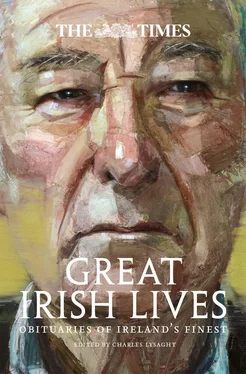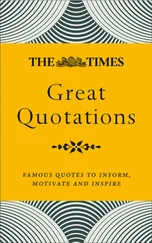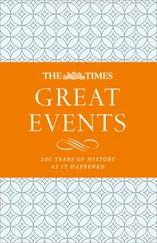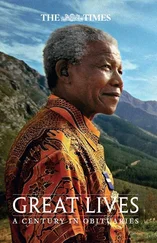Mr O’Connell had been four years at the bar, and had entered upon the 28th year of his age, before he contracted matrimony. His father and his uncle pointed out more than one young lady of good fortune whose alliance with him in marriage they earnestly desired; but he felt bound in honour not to violate the vows which he had interchanged with his cousin, Mary, the daughter of Dr O’Connell of Tralee. Her father was esteemed in his profession, but her marriage portion was next to nothing; and great therefore was the displeasure which this union occasioned. It took place privately on the 23d of June, 1802, at the lodgings of Mr James Connor, the brother-in-law of the bride, in Dame-street, Dublin. This occurrence for some months remained a secret, but eventually all parties became reconciled. Mrs O’Connell was deservedly esteemed by her family and friends, while she enjoyed a large share of her husband’s affection.
Having now reached that period when Mr O’Connell embarked in a profession and assumed the responsibilities of domestic life, we may arrest for a moment the current of his biography, in order to advert briefly to his family and connexions. Nothing is more frequent in society than a demand for “the real history of these O’Connells.” It is often asked have they been “jobbers, hucksters, pedlars, smugglers, and everything base and beggarly? or are they the lineal descendants of the Sovereign Lords of Iveragh, and have they, through successive generations, preserved the purity of gentle blood and the reputation of honourable men?” Alas! who can tell? If there be one thing in this world less worthy of credence than another it is an Irish pedigree. In England the “visitations” are carefully preserved; the records of the Herald’s College in this country, and the business of that office, are conducted quite in the manner of other public departments. Here all proceedings are so much according to law, that every family which preserves its land can prove its pedigree. But, amidst confiscations, burnings, rebellions, and massacres, the regularity of official records can never be maintained, and the evidences of succession degenerate into oral tradition. The ancient Greek, who happened to distinguish himself, usually traced his origin to a deified ancestor; the modern Irishman who makes a noise in the world, always avers that he is descended from a Sovereign Prince; while the world looks on, and with contemptuous impartiality pronounces both genealogies to be equally fabulous. Dismissing, therefore, all idle speculation respecting the early history of the O’Connells, it may be shortly stated that this family originally established itself in Limerick; that about the beginning of the seventeenth century they transferred their residence to the barony of Iveragh, in the western extremity of Kerry; but, being deeply implicated in the rebellion of 1641, they found it convenient to seek shelter in Clare. To this migration Daniel O’Connell, of Aghgore, formed an exception, and he contrived to keep his little modicum of land by not yielding to that appetite for insurrection. His son, John O’Connell of Aghgore and Darrynane, took the field in 1689 at the head of a company of Foot, which he raised for the service of James II., and having served at the siege of Derry, as well as at the battles of the Boyne and Aughrim, was included in the capitulation of Limerick. His eldest son died without issue, but his second son, Daniel, having married a Miss Donoghue, became the father of 22 children. The second of this gentleman’s sons was Morgan, who married Catherine, the daughter of Mr John O’Mullane, of Whitechurch, in the county of Cork; and the eldest son of this Morgan was the extraordinary individual whose death we have now to record. Although nothing can be more absurd than to claim for him an illustrious descent, yet several of his relatives and connexions were respectable, and some of the number have served with distinction in the French and Austrian armies. But, sooth to say, his father was a most undignified person:- a very painstaking, industrious man, whose thoughts never wandered from the main chance; who held a good farm and kept a large shop, or rather a sort of miscellaneous store, which ministered to the limited wants of Cahirciveen and its rude neighbourhood; who is said to have been most adroit in the arts by which money may be acquired, not only in those of the fair dealer, but in those of the free trader. Almost every one who lived on the western coast of Ireland was, in those days, more or less of a smuggler; therefore Maurice of Darrynane and Morgan of Carhen were not much worse than their neighbours in carrying on the contraband or the wrecking trade; and thus did the elder brother keep his acres free from incumbrance, while the younger scraped together pence and pounds, till he was able to acquire a few additional acres at low rents and under long leases, by which means he ascended into that detested class known by the designation of Irish middlemen. He lived to see his son a prosperous barrister, and the acknowledged heir to Maurice of Darrynane; old Morgan therefore left at his death, which took place in 1809, a very considerable portion, if not the greater part, of all that he possessed to his second son, Mr John O’Connell, of Grena.
In the year 1802 Mr O’Connell found himself under the displeasure of his relatives, and obliged to contend with the difficulties which are inseparable from a growing family and a narrow income. The legislative union had then been only just consummated; his first popular harangue, however, was delivered at a meeting of the citizens of Dublin, assembled on the 13th of January, 1800, to petition against the proposed incorporation of the Irish with the British Parliament. The public have long been familiar with the grounds upon which Mr O’Connell was accustomed to urge the claims of his native country to the possession of an independent legislature. It is believed that he never urged those claims with more effect than in his earlier speeches; the very first of which has been extolled as a model of eloquence. It is a generally received opinion that, from the very starting point of his career, he displayed every quality, good and evil, of a perfect demagogue; and, those pernicious accomplishments being once known to the public of Ireland, his success at the bar ceased to be problematical. The great body of the Roman Catholics were only too happy to patronize an aspiring barrister of their own persuasion; the attorneys on the Munster circuit found that his pleadings were much more worthy of being relied on than those of almost any other junior member of the bar; and soon this description of business poured into his hands so abundantly, that he employed first one, and then a second amanuensis. At nisi prius his manner alone was enough to persuade an Irish jury that his client must be right. His anticipation of victory always seemed so unfeigned that, aided by that and other arts, he seldom failed to create in the minds of every jury a prejudice in favour of whichever party had the good fortune to have hired his services. His astonishing skill in cross-examination; the caution, dexterity, and judgment which he displayed in conducting a cause; the clearness and precision with which he disentangled the most intricate mass of evidence, especially in matters of account, procured for him the entire confidence of all those who had legal patronage to dispense. But his not being a Protestant excluded him from much valuable business. A Roman Catholic in those days was never heard in the courts of justice with that gracious approbation which encourages a youthful advocate; before a common jury, however, no man could be more successful than the subject of the present memoir, for this, among other reasons, that a large fund of the broadest humour usually enabled him to have the laugh on his side. In the Rolls Court also, where Mr Curran at that time presided, Mr O’Connell was in the highest favour.
Читать дальше












